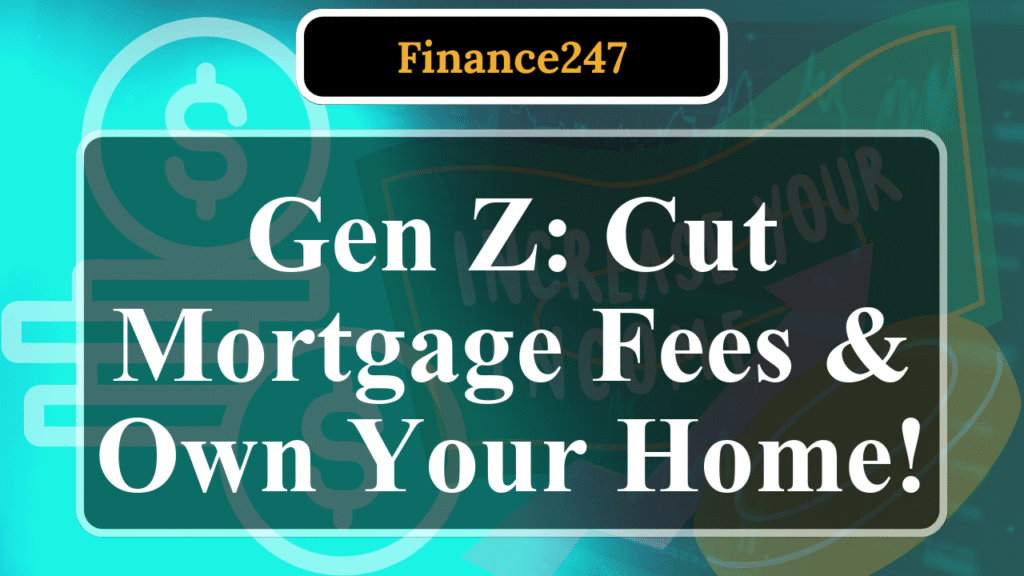“Gen Z faces unique challenges in homeownership due to high housing costs and student debt. This article outlines practical strategies to save on mortgage fees, including shopping for lenders, leveraging low-down-payment loans, making extra payments, and exploring assistance programs. With smart planning, Gen Z can navigate the housing market and reduce costs effectively.”
Strategies for Gen Z to Minimize Mortgage Fees
Shop Around for Lenders to Secure the Best Rates
Gen Z homebuyers, often entering the market with limited savings and credit history, can save thousands by comparing mortgage lenders. As of July 2025, average 30-year fixed mortgage rates hover around 6.8%, but rates vary significantly by lender. For a $300,000 loan, a 0.5% rate difference saves approximately $15,000 in interest over the loan term. Use platforms like NerdWallet or Zillow to compare customized rates based on your credit score and down payment. Mortgage brokers can also streamline this process, though their fees should be weighed against potential savings. Always request loan estimates from multiple lenders to negotiate better terms or lower origination fees, which typically range from 0.5% to 1% of the loan amount.
Opt for Low-Down-Payment Loan Programs
With median home prices at $427,000 in late 2024, saving for a 20% down payment is daunting for Gen Z, who often earn around $38,000 annually in their early 20s. Programs like FHA loans, requiring just 3.5% down, or Fannie Mae’s HomeReady and Freddie Mac’s Home Possible, with 3% down, are ideal. These loans often have competitive rates but may include private mortgage insurance (PMI) if the down payment is under 20%. PMI costs $50–$200 monthly on a $300,000 loan but can be canceled once you reach 20% equity, saving hundreds annually. Check eligibility for state or local first-time buyer grants, which can cover down payments or closing costs (2%–6% of the loan).
Make Extra Payments to Reduce Interest Costs
Paying extra toward your mortgage principal can significantly cut interest fees. For a $350,000, 30-year loan at 6%, adding $100 monthly saves about $30,000 in interest and shaves over two years off the loan term. Biweekly payments, equating to one extra payment annually, can save $47,000 in interest on a $400,000 loan. Confirm with your lender that extra payments reduce principal without prepayment penalties. Gen Z’s tech-savvy nature can leverage budgeting apps like YNAB to automate savings for these payments.
Build and Maintain a Strong Credit Score
Credit scores heavily influence mortgage rates and fees. Gen Z, with shorter credit histories, averages a 620–660 FICO score, often leading to higher rates. A score of 740+ can secure rates 0.25%–0.5% lower, saving $10,000–$20,000 over a 30-year loan. Build credit by becoming an authorized user on a parent’s credit card, paying bills on time, and keeping credit utilization below 30%. Avoid carrying balances, as only 10% of Gen Z does, to maintain strong scores.
Explore House Hacking to Offset Costs
House hacking—buying a multifamily property and renting out units—can make homeownership affordable. A Zillow survey found 54% of young buyers are interested in this strategy. For example, purchasing a duplex for $400,000 and renting one unit for $1,500 monthly can cover half the mortgage payment. This approach suits Gen Z’s flexibility, especially with remote work allowing moves to affordable areas like Jacksonville, NC, or Lima, OH.
Leverage Family Support and First-Time Buyer Programs
About 36% of Gen Z homebuyers rely on family for down payment assistance, with 23.8% receiving cash gifts and 16% using inheritances. Additionally, 22% buy with siblings or parents to share costs. Explore government or nonprofit programs offering grants or low-interest loans, as less than 12% of Gen Z uses these. Living with family temporarily, as 34% of prospective buyers consider, can boost savings for closing costs or emergencies.
Petition to Cancel PMI and Reassess Property Taxes
If your down payment is less than 20%, PMI is likely required, adding $130 monthly on a $200,000 loan. Petition your lender to cancel PMI once your loan balance falls below 80% of the home’s value, potentially requiring an appraisal. Similarly, if your home’s value decreases, challenge your property tax assessment to lower annual taxes, which can run thousands. These steps can free up funds for other financial goals, critical for Gen Z juggling student debt averaging $14,830.
Consider Refinancing When Rates Drop
If mortgage rates fall, refinancing to a lower rate or shorter term (e.g., 15 years) can save tens of thousands. For a $400,000 loan, dropping from 7% to 5% saves $126 monthly and $45,360 over the loan term, though closing costs ($5,000–$10,000) must be recouped. Gen Z should monitor rates via tools like NerdWallet’s refinance calculator and ensure their budget supports higher payments if shortening the term.
Disclaimer: This article provides general financial tips based on publicly available information and industry trends. It is not a substitute for professional financial advice. Consult a certified financial advisor or mortgage professional for personalized guidance. Sources include recent reports from NerdWallet, Zillow, Redfin, and other financial publications.


